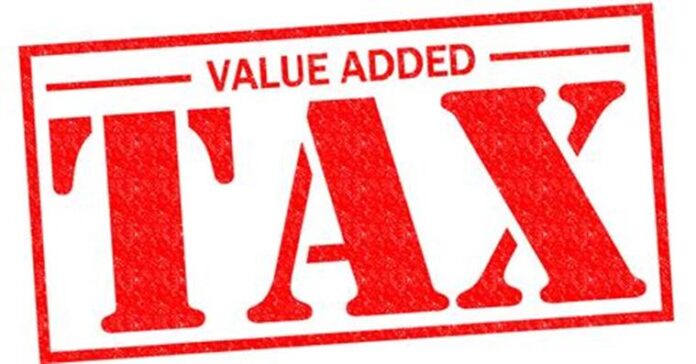By Jeph Ajobaju, Chief Copy Editor
A letter Federal Inland Revenue Service Chairman Muhammad Nami wrote to the National Assembly (NASS) on July 1 to amend the Constitution admits that the FIRS does not have constitutional powers to collect Value Added Tax (VAT).
Nami wrote the letter to House of Representatives Constitution Review Committee Chairman Idris Wase, who is also House Deputy Speaker, and he received it on July 2, about five weeks before the court ruled that the FIRS indeed lacks VAT powers.
VAT is a consumption tax on goods and services. The current rate is 7.5 per cent, a huge tax net that fetched more than N1 trillion into the federal treasury in the first half 2021 alone (H1 2021), according to National Bureau of Statistics (NBS) data.
Lagos alone generates N500 billion VAT yearly (55 per cent of the total), the remaining five South West States (N300 billion), and Rivers N150 billion.
Former Finance Minister Kemi Adeosun disclosed in Abuja on February 10, 2018 that four states and the Federal Capital Territory generate 87 per cent of total VAT yearly as follows:
· Lagos – 55 per cent
· FCT – 20 per cent
· Rivers – 6 per cent
· Kano – 5 per cent
· Kaduna – 1 per cent
A Port Harcourt Federal High Court ruled on August 9 that only Rivers and other states have the constitutional powers to collect VAT and Personal Income Tax (PIT) because they are not on the Exclusive Legislative List in the Constitution.
Justice Stephen Pam issued an order of perpetual injunction restraining the FIRS and the federal AG from collecting and intimidating residents of Rivers State to pay to VAT and PIT to the FIRS.
Among the reliefs sought by Rivers was a declaration that the constitutional powers of the federal government to impose taxes and duties are limited to items listed in items 58 and 59 of Part 1 of the second schedule of the Constitution.
The court granted all the reliefs sought by the state government, among them that
· There is no constitutional basis for the FIRS to collect VAT, Withholding Tax, Education Tax, and Technology Levy in Rivers or in any other state of the federation.
· The powers and competence of Abuja is limited to taxation of incomes, profits, and capital gains which do not include VAT or any other levy except those listed in items 58 and 59 of the Exclusive Legislative List of the Constitution.
The FIRS appealed a few days later to the Court of Appeal.
But the Federal High Court rejected on September 6 an application by the FIRS for a stay execution of the judgment. The court said granting it would negate the principle of equity.
Pam explained in his ruling that
· The FIRS failed to file an application to set aside the Rivers State Tax Law of 2021 recently passed by the state Assembly and signed into law by Governor Nyesom Wike on August 20.
· Therefore the state law on VAT is valid and subsisting.
· It may be difficult for the federal government to refund Rivers if his judgment authorising the state to collect the tax is upheld at the appellate courts, as the federal government already has a huge liability from the many years it has collected VAT on behalf of Rivers.
· Whatever amount Rivers may collect within the litigation period can easily be remitted to the federal government if the state loses at the Appeal Court.
But the FIRS has insisted that it will continue to collect VAT until the matter is settled in the Supreme Court.
Wike disclosed on September 8 that the FIRS is writing letters to intimidate firms to continue to pay VAT to it, even as it lost an appeal that sought a stay of execution of the lower court ruling.
FIRS requests Constitution amendment to empower it
The letter Nami wrote to Wase is titled, ‘Request for sponsorship of a bill for the establishment of the proposed Federal Revenue Court of Nigeria and the insertion of Value Added Tax under item 58 of the exclusive legislative list’.
The PUNCH disclosed that it got a copy of the letter on September 8.
Nami wrote to the NASS to amend the Constitution and place VAT and other related items on the Exclusive List controlled by the federal government.
He pleaded with the NASS to vest exclusively in the FIRS all adjudication of tax disputes, including federal tax laws, Companies Income Tax, Petroleum Tax, Income Tax, Capital Gain Tax, Stamp Duty, VAT, taxes, levies and other laws, regulations, proclamations, government notices and rules.
The letter read in part:
“The Federal Inland Revenue Service further proposes the amendment of Section 251 (1) (b) of the Constitution of the FRN, 1999 (amended) by removing the exclusive jurisdiction of the Federal High Court only on anything connected or related to federal tax matters since same would be vested in the proposed federal revenue court.
“The Federal Inland Revenue Service also proposes the insertion of Value Added Tax immediately after Stamp Duties under item 58, part II of the 2nd schedule of the 1999 Constitution of the FRN [Federal Republic of Nigeria].
“The Federal Inland Revenue Service appreciates the maximum cooperation and support we are receiving from your good office on tax matters generally.
“This has boosted our morale and determination to do more for the government in tax revenue generation.
“The FIRS therefore wishes to further request that the House of Representatives consider the request for the establishment of the Federal Revenue Court.”
Hurdle of amending the Constitution
Unless the Constitution is amended, the FIRS cannot win the argument, even at the Supreme Court.
The Constitution can only be amended with a two-thirds majority each in the Senate and the House of Representatives, as well as two-thirds majority in two-thirds of the 36 state Houses of Assembly. That means 24 states must agree to the amendment.
There are 19 states in the North and 17 in the South.
In the South, agitation for true fiscal federalism has gone on for decades and the court ruling on the VAT has shed more light on the historical injustice of the North being a dogged parasite on the South.
Both Rivers and Lagos are pitching the same true fiscal federalism argument in their pursuit of VAT collection. Other Southern states are watching how it all plays out before they make their own moves.
All the 19 Northern state Houses of Assembly may collude (as usual) to amend the Constitution to perpetuate the injustice of them collecting money they neglect to work for, but they are not likely to get support from five Southern states.
And that will crush the plot.
Ubani cautions FIRS against breaching court ruling
Former Nigerian Bar Association (NBA) Lagos Vice President, Monday Ubani, has counselled the federal government to stop insisting on collecting VAT as doing so contravenes the court judgment.
Ubani told The PUNCH that the FIRS cannot ask Nigerians to continue paying VAT to Abuja when the judgment giving states the power to do so has not been reversed.
“The law is that states should collect VAT. That is the import of the court judgment. The attempt [of the FIRS] to stay execution was defeated. It failed woefully.
“So, the position of the law today is that the states have the right and authority to collect VAT. Until that decision is reversed, the law stands,” he said.
“The federal government knows this and the Constitution states that every authority and power must respect court judgments. And if our leaders swore to uphold the provisions of the constitution, there is no way they can advise people to disobey a competent court order.”
Lagos passes VAT Bill, says FIRS letter to NASS won’t stop us
Lagos House of Assembly passed it VAT Bill on September 9 to enable the state collect consumption tax in its jurisdiction which fetches N500 billion a year.
Governor Babajide Sanwo-Olu signed the bill into law on September 10.
The bill was passed during Assembly plenary at which lawmakers unanimously adopted the recommendations in the report of the Finance Committee as the resolutions of the House, leading to its third reading.
Information Commissioner Gbenga Omotoso told The PUNCH that the passage followed due process and would benefit residents.
His words: “The House has just passed the bill; it has not been returned to the executive. We are waiting for them to bring the bill for the governor to sign.
“I think due process was followed; the bill went through various reading stages and there was a public hearing, where residents of the state made their views known on the bill.
“This is not the first bill that has been passed by the Lagos State House of Assembly. The executive has sent in about 40 bills since Governor Babajide Sanwo-Olu assumed office. This is just one of the bills.
“It is all about Lagosians, the rule of law and true federalism. It is a matter of law, not emotions.”
Omotoso had previously told The PUNCH that the state would go ahead with its VAT bill irrespective of the action of the FIRS.
“The FIRS has a right to write to the National Assembly to seek some concession in whatever aspect of any law it deems necessary; it is a right that nobody can take away from it. States also have a right to formulate laws that they think will help them in the business of government.
“As far as this revenue allocation matter is concerned, Lagos State has taken some steps that will further enhance its stability to go along the line that it recognises as a right in this debate over VAT,” he said.
“The process that the state government has started, there is nothing there that will make it reconsider it …. Irrespective of whatever the FIRS is doing, the Lagos State Government is not going to fold its hands and miss the opportunity for us to push the argument for true fiscal federalism forward.”
River collects N15b, gets N4.7b; Kano collects N2.8b, gets same back
Wike on August 20 signed the state’s VAT bill into law and on September 8 told construction firms, manufacturers, business owners as well as other firms to begin payment of VAT to the state treasury this month.
He told representatives of business at a meeting in Port Harcourt that Rivers generated an average N15 billion VAT to the FIRS monthly but the federal government gave the state only 25 per cent of it.
Wike lamented the injustice in the country, saying Rivers generated N15 billion VAT in June but got N4.7 billion in return, while Kano generated N2.8 the same month and got the same N2.8 billion back.
“Sometimes, you don’t want to believe these things exist,” he said.
He clarified that “Rivers State is challenging the FIRS from collecting VAT in Rivers State. I am not challenging the FIRS from collecting VAT in Abuja. Let it be understood. The law says Rivers must collect VAT in the state.
“The federal government surreptitiously lobbied to amend the constitution to place VAT collection in the exclusive legislative list.
“We have challenged it and we have no apologies to anybody. I don’t want to be in the good books of anybody, but in the good books of God.
“You don’t bully a state like us. The FIRS should be very careful. I have the political will to do a lot of things. If they continue to bully us, I will take (over) all their offices in the state.
“I don’t want you to fall prey to the people, who think they can use force to take our money. If you want to take advantage and say you don’t know who to pay to, it is a lie, you know.
Rivers begins VAT collection
“From this September, we must collect all our VAT.
“All the banks playing pranks by saying they have not heard from their head offices, I will seal off your branches. If I say I will, know that I will.
“We will not look back but seal off the premises of such companies.”
“I will be happy at my time that heaven came down, because I will create a record that it was my time that heaven came down. We don’t have to use the police; we have our security [outfit] as allowed by law and we will use it.
“Please tell your authorities to pay our VAT to our revenue board, which of course you have been told how to do it.
“Until there is a [court] order stopping us, we won’t stop the collection. If an appeal [court] revokes it, no problem, but the position of the law today is that VAT is for Rivers State.
“We are even going back to collect the one they took before. All the ones they have taken before, we are compiling it; they have to pay back to us.
“All those states that are loyal [to the federal government] should wait, but the Rivers State government will collect all that is due to us within the confinement of the law; we will not go outside the law.
“I have looked at the total VAT every month, I have even reduced it; I don’t want this; it is too much; I have even reduced it to what I will collect and I have projects to do with it every month.
“The FIRS cannot threaten you. We are the landlords here, I hope you know that. We have enormous powers to use by law.”
All Govs will perform with adequate revenue, says Wike
Wike stressed that Governors would perform well if their states get enough revenue.
“The problem with us is that we only depend on federal allocations. That is why you hear that most governors are not performing; how will they perform?
“Please, pay the money on time, because every Friday, I will check it. By the end of this month, I want to see the VAT collection.
“If somebody takes what does not belong to them, what do you call them? These people, who take what does not belong to them, collect it for us and you will see what we will do with it; we will turn this state around.
“I have told the Attorney General to give you the VAT law, the Withholding Tax, the Stamp Duty and everything payable to us.
“The Rivers State government is fully in charge of this and we will not hesitate to apply sanctions as provided under the VAT Law No. 4 of Rivers State, 2021.
“The FIRS is writing threat letters to intimidate corporate organisations to pay taxes to it, even after it lost an appeal that sought a stay of execution of the declarative ruling on VAT collection in the state.”















